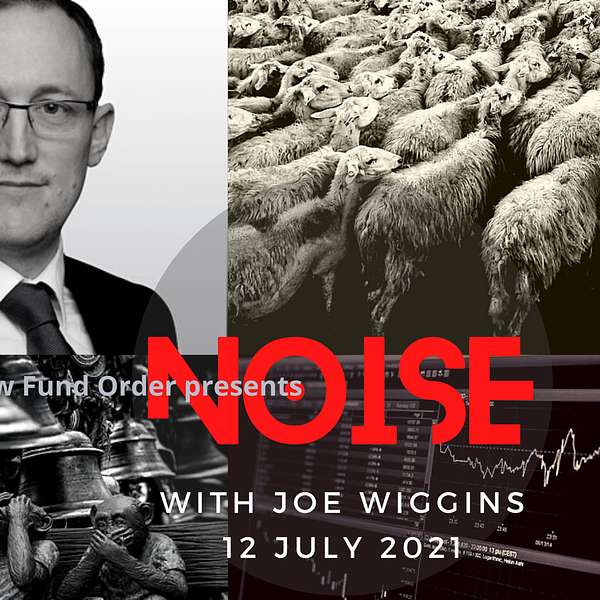
The New Fund Order
Deep from inside the City's shadows... author, speaker, NED and ex investment gatekeeper Jon 'JB' Beckett explores the Industry's taboo and hot topics. Dear Citizens of the People's Republic of Podcast, welcome! The New Fund Order is here; from existential risk to the human condition, a contrarian exploration of the Darkside, the Frontier and the Fringe of; Asset Management, Finance, Fintech, Mutual Funds and Macro. Bringing you news, views and interviews. Like a philosophy-economics mash up with science fiction, B-movies, Kung Fu films, cold war spy films, to Spaghetti Westerns... all delivered from the left-field with an Orwellian chill.. #newfundorder ALL VIEWS ARE INDEPENDENT. PLEASE check out my book website: https://www.blurb.co.uk/b/7337318-newfundorder-2-0 and Youtube channel https://www.youtube.com/channel/UClzN8gpccuVtdfW47TM_pPQ Season 2 ‘Fight Club’ is here ...
The New Fund Order
Noise: Funds and Frontier Psychiatry (with Joe Wiggins)
Welcome to the New Fund Order. An Orwellian journey into the Darkside, the Frontier and the Fringe of Finance.
Bombarding your airwaves, this episode explores the implications of behavioural finance and Daniel Kahneman's latest book 'Noise'. How is 24/7 media impacting investing decisions? We go overwatch with our guide, and experienced asset allocator and behavioural observer, Joe Wiggins (ex ASI).
Together we examine 'noise' versus investor and fund selector biases and; variability and inconsistency, which is even more difficult to manage compared to consistent biases, how base rates and other tools can be used to cut through that noise and ultimately explore some of the behavioural trappings common to wealth management and fund research.
Check out Joe's blog here: Joe Wiggins | Behavioural Investment
Check out more about Kahneman's book 'Noise' here: Home - The Noise Book (readnoise.com)
Together with left-field opinion, global market news and latest views, direct from my dystopian bunker. In association with my sponsor Allianz Global Investors (AGI) one of the world's leading active managers. My thanks to my guest Joe.. and you dear listener.
Please LIKE, SHARE and SUBSCRIBE. Please leave a REVIEW and let me know what you think and what topics you would like for future episodes. Until then... stay safe and.. keep it left-field!!
That's 20 episodes, 20 Guests, every 2 weeks... each episode is 25 minutes!
Join the NFO Army Citizen, https://www.patreon.com/newfundorder
Left-field Finance.
#newfundorder
Credits
George Orwell 'Nineteen-Eighty Four', Public Domain 1.0. Assorted news clips unattributed. Source: Youtube.com . Additional Sound effects by Soundbible.com. Creative Commons Attribution 3.0 and Public Domain 1.0. All additional Music used by Silvermansound.com Attribution 4.0 International (CC BY 4.0)
Active is: Allianz Global Investors.
Disclaimer: This post contains affiliate links. If you make a purchase, I may receive a commission at no extra cost to you.
Generic News/Noise 0:03
The Dow tumbles lower for a second day in a row after yesterday's highly anticipated policy update from last day on Wall Street, the Dow sinking over 1400 points officially entering bear market territory once again related to fears over Coronavirus and pessimism than any economic stimulus measures are still wrong. This time. It's different with regards to the rotation but
JB Beckett 0:31
Salutations Dear citizens, as we peer into the new fund order to discover the immutable truth for asset management and wealth managers, the lowdown from the dark side the frontier on the fringe of asset management fund research
Generic News/Noise 0:48
In the last couple of weeks yields have been moving from a lot of money shooting high growth into what they perceive as value it has been quite...
JB Beckett 1:00
A podcast for wealth managers fund selectors, distributors and investors. Bringing to you the People's Republic podcast of finance, in association with my sponsor, Allianz global investors, capturing the latest market news views and interviews with leading minds in our industry.
Generic News/Noise 1:19
Plus, starting to crack down on crypto enthusiasts.
JB Beckett 1:23
Allianz global investors is one of the world's leading active managers
Generic News/Noise 1:32
Related to fears over Coronavirus and pessimism that any economic stimulus measures are still far off at this time. It's different with regards to the rotation but let's also realise that this rotation was occurring now there's a very fundamental reason to support the continuing rotation surge to start the year. Many are again asking are you better off with passive index investing? They're gonna have to find another argument in the markets the last couple of weeks yields have been moving a lot of money shifting from high growth.
JB Beckett 2:03
And in these strange pandemic lockdown times, rest assured that all guests are calling in remotely interview.
Hi, Joe, welcome to the frontier, the new fund order
Joe 2:17
A pleasure to be here JB, good to speak to you today.
JB Beckett 2:20
Likewise, other than obviously we're both fund allocators; we are also both observers of the behavioural and I guess the sociological in markets. As an experienced multi manager and asset allocator most recently at Aberdeen standard. You have been the author of a behavioural investing blog noting Daniel Kahneman, his new book 'Noise', noise and bias and I think just for the benefit of the listeners, firstly, what is noise? What does it mean for fund investors? How is that information noise changing investor biases? What are the largest biases fund selectors are falling into?
Joe 3:01
Absolutely is really interesting area and I think noise is incredibly important will become an increasing area of focus over the next few years focusing on biases and variable biases for the last decade, as particularly Daniel Kahneman work to become popularised 'Thinking Fast and Slow'. And that whole literature around behavioural biases and narrative finance has become relevant to the day to day decisions that investors and fund investors make the noise looks at it from a slightly different angle. But an equally important one, maybe maybe more important than biases.
And noise is really about the inconsistent judgments that we make. So you can think about biases as being consistent errors in the decisions that we make. So if you have a biassed clock, it's still useful if it's five minutes fast every day, all the time, because you can make that adjustment. Whereas if you have a noisy clock, it's not useful at all, because you don't know whether it's fast or slow. So you can't make any any good judgments or adjustments for that and the noise. So noise is about variability. So you're not missing the target in a consistent fashion, you're missing it in an erratic fashion. So it's harder to kind of define and capture than biases is probably why it's more difficult to talk about is not really discussed, because quite hard to frame and capture in any any reasonable way is to two types of noise as I see it for fund investors to think about noise in the things that affect our decision making but don't really matter at all, but affect us in making judgments. So there'll be how we feel any pressure around it might be about incentives, it might be about relationships, to things that do affect our judgement through time. And when we make decisions and that will mean you might make a different decision today to when we make in a month's time, even if the information is the same because of external factors.
And the other part of noise, which is probably more important is the things that we think matter, but don't so the stuff that we think is information and it's informing our decision making gradually. It's noise, it doesn't mean anything that can be certainly for bond investors. The obsession with past performance in might be the latest economic developments and narratives that we've got no chance of predicting, but obsess over those kinds of noisy things that take us away from focusing on the areas where we think we can make sensible, consistent judgments. So I think it's really important for us to think about how we make our decision making more rigorous and robust and consistent. And we're just, we're just faced with a cacophony of noise and the ability to make clear headed consistent decisions is incredibly compromised, particularly I think, for for professional investors are professional fund investors, and who have to operate under scrutiny a very short time horizons, I just facing noise every day because they have to engage with markets every day. It's a slight advantage for private investors, because it's easier for them to shut themselves off from the noise. And from those things that might affect your feelings or your decision makings and your judgments
JB Beckett 5:57
At times, I almost sense almost a degree of frustration, perhaps with some of the biases of other professional fund investors. But let's pick on one of the hot ones discerning luck from skill, speculation from investing... does spotting skill from luck become the fundamental precept of choosing an active manager over an index?
Joe 6:22
Yeah. So I definitely say that I am frustrated by things I see. But not just things I see. Because I'm susceptible to these these issues, as anyone elses bear the scars of them as well. I think the luck and skill thing is just incredibly important. I think anyone involved in active manager selection, if we can frame it in a binary fashion, I think realistically, everyone's an active investor in some form, whatever you're doing whatever selection we're making, but let's frame it as trying to pick an active manager to outperform a particular market or benchmark, what you're trying to do is identify skill. So some, some level of expertise that can deliver additional returns additional reward through time. And I think we have a real problem with conflating luck and skill. Because we're so obsessed with past performance, we don't quite understand fully the amount of randomness and in essence, chaos in the in this in the system, I think we need to accept that. If all active managers were were picking stocks out of a hat, the distribution of returns would probably look pretty similar to what they are.
Anyway, when we think there's some skill involved in the game. So you'd still get stuff on managers, you'd still get streaks of strong performance in consecutive years about performance, and you get years of underperformance of well, even if it was entirely at random. And what's really important not to do whenever you have a game. And let's think of as a game for the moment, if you have a game where there is luck involved in outcome, you cannot judge skill based on outcomes alone, because of that randomness. elements, you need to be very careful about that. And what I think all fund investors and myself included need to be better at think more about is being specific about what the skill or skills they're identifying or investing in is. Often when we talk about skills, we're probably a little too vague, talking about their value investor or contrarian or they're looking at buying high quality compounding companies that in essence is in it's not really a skill, and it's certainly something that could be quite easily systematised. So what what specifically is the skill or the advantage, that an investor that you favour has? And that's all about linking process to outcomes? So you have to if you want to identify skill, you have to say, does this person want? Does his team have a process? And can we link it to the outcomes that are being delivered, you can't look at just one side of that you can't just look at outcomes.
And I think the other important element about skill and thinking about skill in active management is understanding that different fund managers are involved in different games in different ways and compare them against each other and not compare them against people doing wildly different things. So if we have, we have a manager who's a quality growth, investor talking in very broad terms, investing over the long term, we shouldn't really be comparing them to an investor who's focused on short term earnings momentum, because they're playing different games, and they're using the market in a different way. So you need to be very specific about what games you think are being the people are involved in and what skills specifically they have. That means that they can deliver our performance because our default starting point should be that investors do not have skill. And it is our job to provide evidence that that they do have skill with the safest assumption is to assume that they don't have skill.
JB Beckett 7:42
You know, you and I both know that. I guess one of the great trappings I think of our profession is being drawn into narratives and stories with particular fund managers, that over familiarity, and of course, all the biases start to creep in. But of course there are there are tools to cut through some of those biases and you talk about adopting an inside as well as an outside view and using base rates. So firstly, what are base rates? And how should fund investors use them to help cut through noise to help them with a decision making?
Joe 10:09
Yes, great question. The inside view when you make a judgement is about the specifics of the particular case. So let's take it from a fund selection perspective. The inside view is about the manager, that pedigree the team, the process they have the systems they have, it's about the specific features of that of that instance, that we're thinking about. And obviously, narratives and stories around that are wrapped up in it as well. The outside view, by contrast, is just the general lessons. So did the broad evidence of this type of situation, forgetting about the specifics of the case, or thinking about the general lessons we might learn from this type of situation, it is really important to consider both aspects and probably the outside view first, but fund selection is very much an inside view activity.
It's all about the specifics on this incredible manager that I've identified with these distinct characteristics. Rather than thinking about the broad environment of this type of manager, this type of opportunity. And the best type of outside view to take is to use base rates. And that's to think about using estimates or information that's based on historical contemporaneous examples of similar situations. So let's take an example. Let's say you've got an equity analyst who's looking at the auto sector and a particular company in the auto sector, and they're looking to forecast operating margins for that company. The inside view is focusing just on the specific specifics of that company, when looking to forecast the operating margin, the outside view is saying, what is the history of operating margins for car companies going back in time and looking at peers as well? So it's taking a much broader approach and saying, What's the starting assumption here? For this judgement? I'm about to make what ballpark should I be in rather than starting from the inside view and the specifics without understanding the context of the of the overall question that you're asking, or the problem you're trying to solve?
To want to think about it from a fund selection perspective, let's say on the inside view, you've got this fantastic manager that meets all your criteria, but on a very specific basis, you just think they're exceptionally talented, the outside view might be in this particular asset class, our base rate for managers outperforming over a five year time horizon is 10%. Only 10% of managers in this asset class tended to outperform the market, the outside view is incredibly important in understanding what do you think is a good idea to invest with that manager, because you know, the odds are heavily stacked against you, if you don't have the outside view than just thinking about the specifics of the case, you don't have any base rates, you don't have any odds. So you don't realise that your chances of success in that net regard are actually very low. And you can do it in other ways as well. So if you're, there's no, there's no one number, which is a base rate. But let's say you're looking to buy an active manager has been incredibly successful and has outperformed by 5%. annualised over the last 10 years, you might look at historic instances of managers with a similar track record, and what happened to them following that period of performance. Now, my base rate for managers continuing to outperform after generating subjects as returns might be 5% of managers continue to outperform, or maybe none of them continue to outperform.
And that kind of base rate is incredibly important in framing your decision, how sensible how reasonable, how rational is your decision, I think it makes sense to start all of your decision making with from a fun perspective, from the outside view, what's the context of this decision? What's the what are the odds of this decision? And then you might adjust that based on inside view just based on particular insight you have about the situation?
JB Beckett 13:33
It's interesting that you, you touch on the I guess the time aspects to the time horizon, I guess, between the outside and the inside view. And I'm thinking back here to the, you know, the fidelity Magellan studies of the mid 90s, the mid 2000s. The sense, I guess that investors were perhaps becoming more short termist, I guess, firstly, do you agree? And if it is, is that.. growing latency, having a real detrimental impact on that inside view, outside view approach?
Joe 14:03
Yeah, I think time horizons, an increasing myopia is undoubtedly, the biggest problem faced by fund investors. And economic cut, the pressure comes from everywhere. So it comes from clients, from shareholders from the media, from regulators increasingly as well, focusing on time periods, which are, again, just dominated by meaningless noise really. So one quarter, six months, one year, those periods where market fluctuations are random, incredibly difficult to predict. You're trying to make judgments about the quality of an investment over that period. So what I would say is that anyone with the ability to take a longer term view, let's say you're able to take a five year view has a huge edge and advantage over everyone else, because everyone else is working from quarter to quarter, six months to six months and trying to get through the next quarterly report.
So anyone with a genuine ability to take along term view has a huge edge. And theoretically, it's quite simple one to explore it. But clearly you've got to be in the right environment to do that. One of the concerns I have about fund selection is it was a discipline is, unfortunately, the interests of fund selectors have become, you know, real fought with their own misaligned with long term interests of clients and long term prudent investment decision making. Because in a world of myopia, when you're under pressure from various stakeholders about short term performance, it's in the interest of fund selectors to to keep your job is to sell the laggards by the flavour of the month funds.
So people don't have to worry about their legacies anymore and can be happy, they've got some decent performance in there. You change your job after three years. So no one really notices that the long-term cost of that type of trading behaviour, people just don't have the time horizons to make prudent investment decisions, and then wait for them to come to fruition. It's really difficult to work out what the solution to that is. But I think things like adding friction to an investment process is good to make more long term education. Certainly more education about behaviour. And even blending managers are different styles just to try and insulate you from the strong desire to react to short term performance. And I think we're in a situation where it's quite easy as a fund investor to do stuff that makes you feel better in the near term. And then you can just repent at leisure. But there's a long term cost for that type of performance chasing daily or myopia.
JB Beckett 16:33
Pre occupancy that we have about certain standard time periods of performance. When it comes to driving fund development actions, corporate actions, fund manager changes, fund selection processes, screens, etc. system of control, not exactly the sort of thing you want to be to be trying chasing. And again, I think when we're talking about this pressures on fund selectors, the rapid advancement of the ESG agenda right now amongst fund selectors, which has a long-term aim, but is leading to a huge amount of short-term noise, a lot of short term decisions to try and rapidly transition. What's your take on all that? Is that going to be a source for inefficient decision making in the near term, somehow as an acceptable compromise so that we achieve longer term ambitions?
Joe 17:31
I think that there's definite frustrations around what's happening around greenwashing and kind of the whole 'ESG is in our DNA nonsense' that you hear all the time and lacks any kind of reasonable credibility. So I think there are elements of it that are frustrating. And obviously, we're in an environment where active managers are seeing margins under increasing pressure from the movement to passive. And clearly there have been incentives and herein questionable motives. But I think the broad movement of what's happening, the movement away from simple shareholder value maximisation towards sustainability is almost undoubtedly beneficial for the people on the planet.
So I think that movement generally is almost certainly uniformly positive, I think we need to be slightly careful about how we, how we framing that that change, one of the concerns I definitely have is about making ESG into a performance narrative to saying that if we have positive ESG, or sustainability characteristics, how we might frame them in a fund, then that leads to some kind of excess return or some kind of factual premium from investing in ESG factors. And I think that's problematic for two reasons. One is that the evidence is just not strong enough, we've been through a decade or more value on the forming quality growth outperforming there's no way you can reasonably disentangle that from some of the ESG factors. And so don't think that doesn't mean that ESG factors don't exist or that they will not deliver some kind of excess return through time. But it just means if there is enough evidence to make various bold claims about it, I think the narrative saying you can do good and get excess returns. I think that's a stretch.
I think it's problematic, a) because I'm not sure the evidence is strong enough to say it, but be what happens when it doesn't work? So you want clients to come on this journey with you and to for them to buy into sustainable investing into ESG. Investing, if you make the claims about performance, and then you go through the inevitable periods of disappointing performance. And let's say we have three years when positive ESG stocks underperform? What happens then do we abandon them? Because we've said to people that that leads to out performance and now they're not outperforming what's people's tolerance for for ESG or sustainable strategies underperforming? And I'm not sure about that. And I think that's why the messaging shouldn't be about this fund will outperform because it's got strong ESG characteristics and there's a there's a better narrative than that one. And I think that narrative is movement of waves and movement away from shareholder value maximisation is very good for people in the planet.
And I think The returns of the majority of asset classes and therefore the majority of funds are likely to be significantly higher. If we avoid the negative consequences of unchecked climate change, you'll never see these returns be returned, you'd like to be much better if the asset management industry starts taking ESG, and particularly climate issues more seriously. And the consequences are pretty grim if they don't have to doing so should lead to better returns better growth over the long term. That's not a fun, specific thing. Clearly, there's fun, specific opportunities. But really, I think it's about a movement of an industry to stop focusing so much on quite narrow shareholder motives and focusing more on why did we were stakeholders on society and I think that's a that's a good thing.
But we need to be really careful about how we message it and be really careful about creating short term performance narratives around it. But I think that will just lead to a situation where when it doesn't work, which let's be clear, even if a factor works incredibly well, over the long term, there will be periods quite a long period of time when it doesn't work, you just create a situation where people start abandon it, because you've created the wrong narrative about about how ESG and sustainable investing might improve returns. I think it's a much broader narrative to think about rather than fund x will do better than fund why because as better ESG characteristics,
JB Beckett 21:08
if you're a free market supporter, then this I guess, increasing politicising of funds, fund markets investing is possibly... I probably got greatest sympathy for fund selectors facing into that green noise because all those around them perhaps see confront you're dealing with ESG as somehow as a binary you do it or you don't do it. Whereas as you know, fund selectors, those who have prided ourselves as professional fund investors, we are the balancer of risks, the arbiter of various inputs to try to get to an effective and efficient decision. And I can imagine the pressure will be ramping up quite significantly on the fund selectors,
But let's finish off with a fun a fun part and this is the bit that all my guests love which is the the 10 question rapid fire round geo. If you're ready, we shall get started.
Joe 22:07
Let's go.
JB Beckett 22:07
Good stuff. Question number one, bull or bear?
Joe 22:13
Bull
JB Beckett 22:14
Question number two Bogle or Buffett
Joe 22:18
Bogle.
JB Beckett 22:21
Question three, prophet or planet?
Joe 22:24
Planet.
JB Beckett 22:26
Question four, divest or engage?
Joe 22:30
Engage,
JB Beckett 22:31
Question five, lower cost or better value?
Joe 22:34
Better value.
JB Beckett 22:36
Question six supertankers are boutiques?
Joe 22:40
Boutiques.
JB Beckett 22:42
Question seven star managers or team players?
Joe 22:46
Team players.
JB Beckett 22:48
Question eight, public or private?
Joe 22:51
Public
JB Beckett 22:53
Question nine, high growth or stable income?
Joe 22:58
Stable income
JB Beckett 22:59
..and question 10. My favourite socialism or free market?
Joe 23:06
If it's binary.. socialism
JB Beckett 23:09
I did not expect that good stuff. And that just leaves our little bonus round. If you can choose a number between 11 and 14
39.
....Here we go question 39: art or science?
Joe 23:34
Science
JB Beckett 23:34
Science, great stuff. And that marks the end of the interview. Joe Wiggins. Just want to say thanks very much for jumping on. It's I know it can be a bit of a random walk coming on the show. But I just want to say thanks very much. It's been great to, I guess get into this discussion about noise and the decision making process for fund selector. So thanks very much.
Joe 23:58
Thank you really enjoyed it.
JB Beckett 23:59
Please don't forget to like and share and subscribe you know, click the subscribe button, a new podcast every two weeks with a new guest. Stay tuned.
A big thanks to you, dear listener for tuning in. Brought to you by my sponsor Allianz Global Investors. A warm thanks to today's guest. Legally, I am compelled to remind everyone that all views of this podcast are independent and do not belong to any affiliation or organisation. Just in case that was in any case.
Tune in for the next podcast every two weeks from the
Computer 24:35
new fund order.
JB Beckett 24:37
Please subscribe, share, like and comment. Let me know what you think and what you'd like covered in future episodes. Until then stay safe and keep it left field!
Generic News/Noise 24:50
Wall Street The Dow sinking over 1400 points officially entering bear market territory once again related to fears over Coronavirus and pessimism that any economic stimulus measures are still far off at this time. It's different with realise that this rotation was occurring. Support the continuing rotation I'm asking Are you better off with it another argument in the markets the last couple of weeks yields have been moving seems a lot of money shifting from high growth into what they perceive as value. It has been quite the...
Transcribed by https://otter.ai







